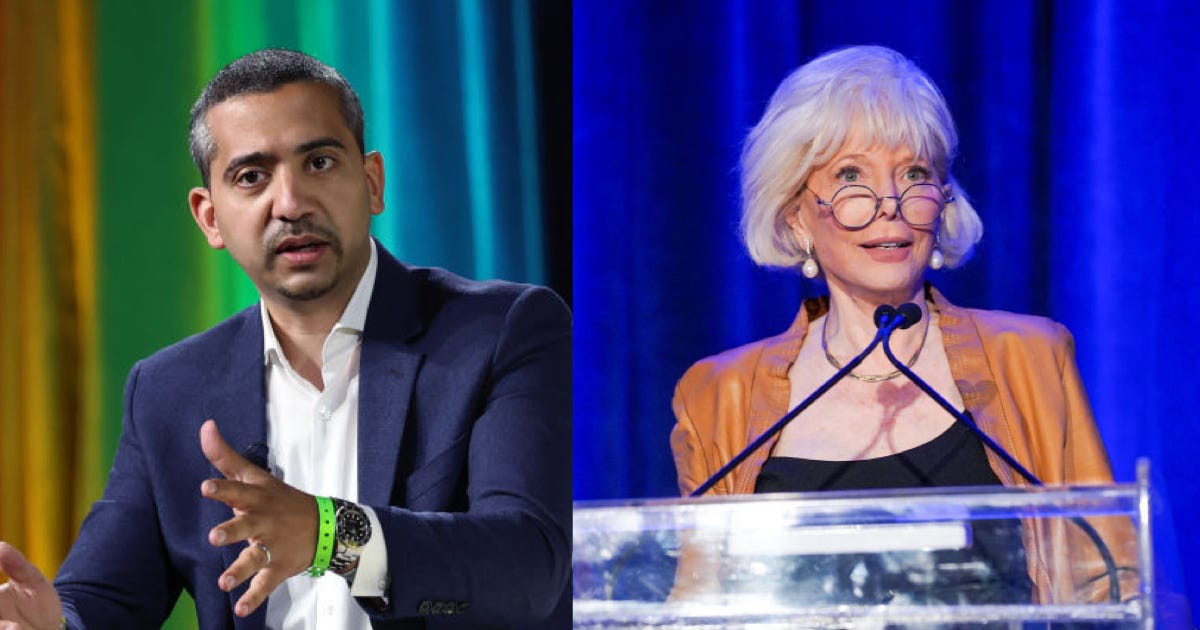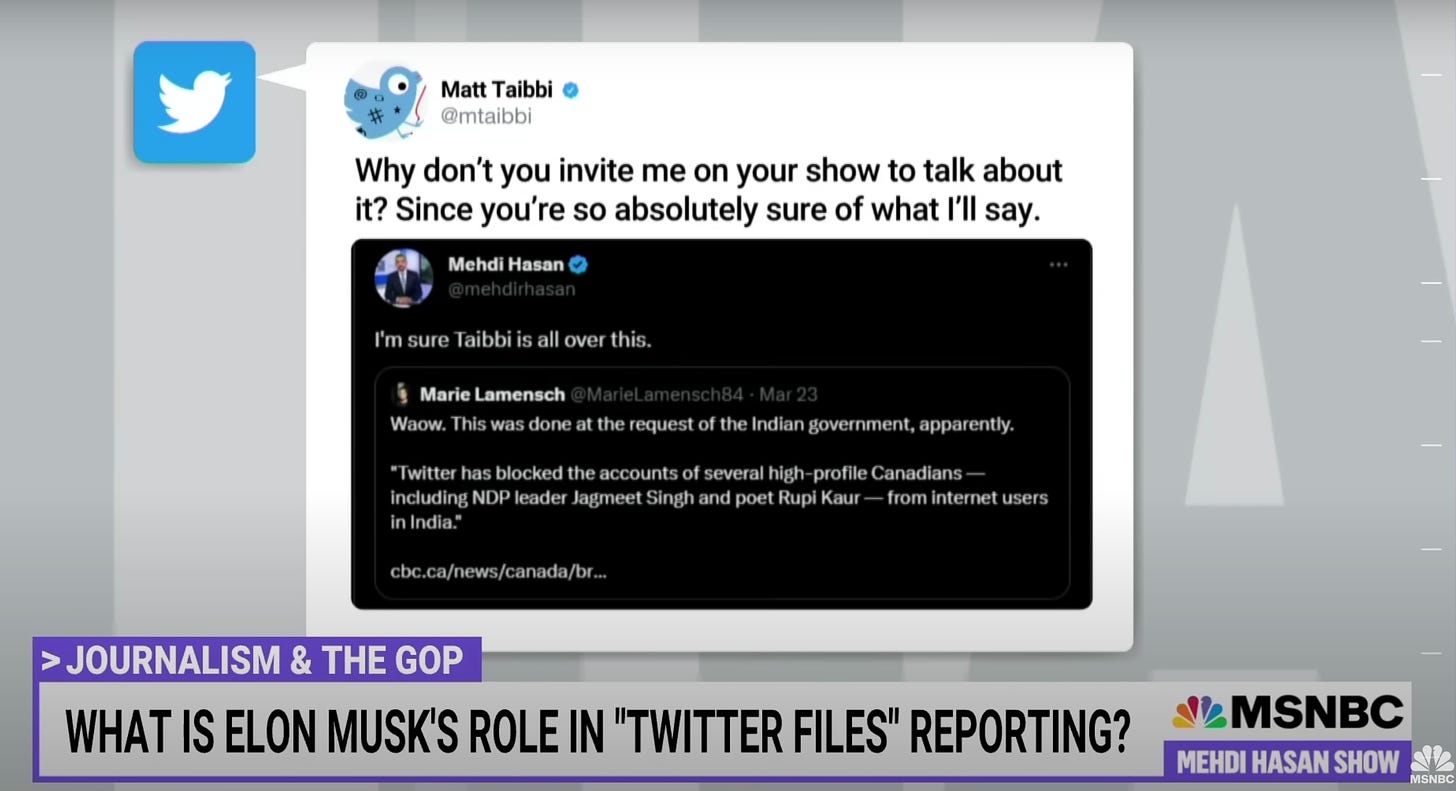~~ recommended by newestbeginning ~~
Hello, readers. Parker here with another edition of The Present Age. Let’s talk a bit about TV interviews.

Specifically, I want to discuss two types of interviews with powerful people — one focused on providing a subject with a platform to share their views with minimal interruption, and one focused on challenging the subject in the name of truth.
On Sunday, April 2, CBS News aired a profile of Rep. Marjorie Taylor Greene (R-GA) on 60 Minutes
The nearly 14-minute video featured an interview between Greene and CBS’s Lesley Stahl, as well as some very sympathetic b-roll of Greene doing CrossFit.
Stahl seemed out of her depth and unprepared, which is especially baffling when you consider that this wasn’t a live interview. Take, for instance, this exchange (from the CBS transcript):
STAHL (voice over): Greene complains that the news media harp on things she did in the past, like, as in this video, chasing after a survivor of the Parkland, Florida school shooting.
And things she says that are over the top, like —
STAHL (on camera, interviewing Greene): “The Democrats are a party of pedophiles.”
GREENE: I would definitely say so. They support grooming children.
STAHL: They are not pedophiles. Why would you say that?
GREENE: Democrats, Democrats support, even Joe Biden, the president himself, supports children being sexualized and having transgender surgeries. Sexualizing children is what pedophiles do to children.
STAHL: Wow. OK. But my question really is, can't you fight for what you believe in without all that name-calling and without the personal attacks?
GREENE: Well, I would ask the same question to the other side, because all they've done is call me names and insult me non-stop since I've been here, Lesley. They call me racist. They call me sen, anti-Semitic, which is not true. I'm not calling anyone names. I'm calling out the truth basically-
STAHL: Pedophile?
GREENE: Pedophi-- call it what it is.
See, Stahl didn’t take issue with Greene's false claim that Joe Biden “supports children being sexualized and having transgender surgeries.” This argument that trans people are inherently “sexual” is offensive and wrong. It’s built on the long-debunked argument that trans people are simply living out some sort of sexual fetish or are trying to reinforce gender stereotypes (that one really doesn’t make sense, especially if you think about it for any length of time). As TPA has noted, there’s nothing “sexual” about trans kids. Stahl’s issue with all of this was that it was rude for Greene to call Democrats “pedophiles,” not with Greene’s false characterization.
Anyway, enough has been written about this particular segment by other people, so I’m not going to get into it anymore. I want to move on to the second of these two TV interviews.
Just a few short days later, we got to see the polar opposite, when MSNBC’s Mehdi Hasan interviewed Matt Taibbi
Let’s start with something fairly obvious: I am a big fan of Mehdi Hasan. In fact, back when I started working at Media Matters in 2018, one of the very first stories I wrote was about how journalists at foreign media outlets (in that piece, I wrote about Daniel Dale, who was at the Toronto Star at the time; Hasan, who was at Al-Jazeera English; and the BBC’s Emily Maitlis) were doing a much better job of eschewing the “access journalism” traps that often result in forgettable softball interviews.
If journalists are posing tough but factual questions, then who cares how conservatives -- or liberals, for that matter -- feel about that? U.S. conservatives, of course, have a long, tried-and-tested history of 'playing the ref' and pressuring media organizations to soften their coverage with bad-faith accusations of liberal bias.
One way around this is for interviewers to establish reputations for being tough with politicians from across the spectrum. Only a handful of U.S. cable news interviewers do this -- Jake Tapper and Chris Wallace, off the top of my head. But they're still not tough enough -- especially with Trump administration officials and supporters who like to tell brazen lies live on air.
And yes, Hasan does grill people on both sides of the aisle. Here’s a link to his grilling of Obama administration deputy national security adviser Ben Rhodes, and another interview he did with Obama advisor Derek Chollet. The long and short of it is that if you’re doing an interview with Hasan, you’d better come prepared; he sure as hell will.
Now, to the interview he did recently with “Twitter Files” author Taibbi:
https://youtu.be/a597e6Wv_xg
While the whole thing gets a bit jargon-y — especially for people who haven’t read through Taibbi’s lengthy, rambling Twitter threads in which he insists over and over that he’s presenting smoking gun evidence that the government had been censoring Twitter during the 2020 election — it becomes clear that Taibbi was, at minimum, sloppy, which is one of the worst things for a journalist to be.
Mike Masnick at Techdirt has a great post that breaks down what the various issues at hand were, why it matters that Taibbi got details about what he called the “industrial censorship complex” wrong, and casts doubt that Taibbi actually understood the stuff he was churning out while acting as Elon Musk’s henchman.
As we keep showing, Matt makes very sloppy errors at every turn, doesn’t understand the stuff he has found, and is confused about some fairly basic concepts.
The errors that Hasan highlights matter a lot. A key one is Taibbi’s claim that the Election Integrity Partnership flagged 22 million tweets for Twitter to take down in partnership with the government. This is flat out wrong. The EIP, which was focused on studying election interference, flagged less than 3,000 tweets for Twitter to review (2,890 to be exact).
And they were quite clear in their report on how all this worked. EIP was an academic project to track election interference information and how it flowed across social media. The 22 million figure shows up in the report, but it was just a count of how many tweets they tracked in trying to follow how this information spread, not seeking to remove it. And the vast majority of those tweets weren’t even related to the ones they did explicitly create tickets on.
In total, our incident-related tweet data included 5,888,771 tweets and retweets from ticket status IDs directly, 1,094,115 tweets and retweets collected first from ticket URLs, and 14,914,478 from keyword searches, for a total of 21,897,364 tweets.
Tracking how information spreads is… um… not a problem now is it? Is Taibbi really claiming that academics shouldn’t track the flow of information?
Either way, Taibbi overstated the number of tweets that EIP reported by 21,894,474 tweets. In percentage terms, the actual number of reported tweets was 0.013% of the number Taibbi claimed.
Okay, you say, but STILL, if the government is flagging even 2,890 tweets, that’s still a problem! And it would be if it was the government flagging those tweets. But it’s not. As the report details, basically all of the tickets in the system were created by non-government entities, mainly from the EIP members themselves (Stanford, University of Washington, Graphika, and Digital Forensics Lab).
And later in the piece:
There’s a lot more that Taibbi gets wrong in all of this, but the points that Hasan got him to admit he was wrong about are literally core pieces in the underlying foundation of his entire argument.
At one point in the interview, Hasan also does a nice job pointing out that the posts that the Biden campaign (note: not the government) flagged to Twitter were of Hunter Biden’s dick pics, not anything political (we’ve discussed this point before) and Taibbi stammers some more and claims that “the ordinary person can’t just call up Twitter and have something taken off Twitter. If you put something nasty about me on Twitter, I can’t just call up Twitter…”
Except… that’s wrong. In multiple ways. First off, it’s not just “something nasty.” It’s literally non-consensual nude photos. Second, actually, given Taibbi’s close relationship with Twitter these days, uh, yeah, he almost certainly could just call them up. But, most importantly, the claim about “the ordinary” person not being able to have non-consensual nude images taken off the site? That’s wrong.
You can. There’s a form for it right here. And I’ll admit that I’m not sure how well staffed Twitter’s trust & safety team is to handle those reports today, but it definitely used to have a team of people who would review those reports and take down non-consensual nude photos, just as they did with the Hunter Biden images.
As Hasan notes, Taibbi left out this crucial context to make his claims seem way more damning than they were. Taibbi’s response is… bizarre. Hasan asks him if he knew that the URLs were nudes of Hunter Biden and Taibbi admits that “of course” he did, but when Hasan asks him why he didn’t tell people that, Taibbi says “because I didn’t need to!”
Except, yeah, you kinda do. It’s vital context. Without it, the original Twitter Files thread implied that the Biden campaign (again, not the government) was trying to suppress political content or embarrassing content that would harm the campaign. The context that it’s Hunter’s dick pics is totally relevant and essential to understanding the story.
And this is exactly what the rest of Hasan’s interview (and what I’ve described above) lays out in great detail: Taibbi isn’t just sloppy with facts, which is problematic enough. He leaves out the very important context that highlights how the big conspiracy he’s reporting is… not big, not a conspiracy, and not even remotely problematic.
And this doesn’t even touch on the fact that Taibbi got Hasan to invite him on for an interview under false pretenses. After mockingly tweeting, “I’m sure Taibbi is all over this,” in response to a tweet about Musk censoring tweets at the request of the Indian government, Taibbi responded, “Why don’t you invite me on your show to talk about it? Since you’re so absolutely sure of what I’ll say.”
Hasan did invite Taibbi on his show to discuss it, but when the question came up, Taibbi didn’t have an answer ready (even though, again, this was supposedly the entire reason for the interview in the first place).
The interview was a disaster for Taibbi, and he’s been in spin mode ever since, trying to convince people that actually, it doesn’t matter that several claims that were central to his “Twitter Files” reporting turned out to be false, or that these were somehow “gotcha” questions.
Taibbi may have benefited from reading a copy of Hasan’s recently-released book, Win Every Argument: The Art of Debating, Persuading, and Public Speaking. Chapters 3 (“Show Your Receipts”), 14 (“Practice Makes Perfect”), and 15 (“Do Your Homework”) would have certainly come in handy.
These two interviews represent two very different sides of the news media
One side (the side represented by Stahl’s 60 Minutes interview with Greene) treats the interview space as a platform for the interviewee to tell their “side” of a story, largely without pushback, even if only for the sake of keeping things moving along and creating a pleasant TV viewing experience for people at home. The other side (the side represented by Hasan) treats the interview space as an intellectual battlefield. That side leans into awkward silences, frustration, and so on. I’ll be entirely honest: watching the Hasan/Taibbi interview was uncomfortable, but it was a good discomfort, and it was something that was memorable. What was memorable about Stahl’s interview with Greene? Aside from the part where Stahl let Greene push anti-trans nonsense?
Let’s also be clear about something: it’s the Stahl side of this that is the current norm in U.S. news media.

No comments:
Post a Comment